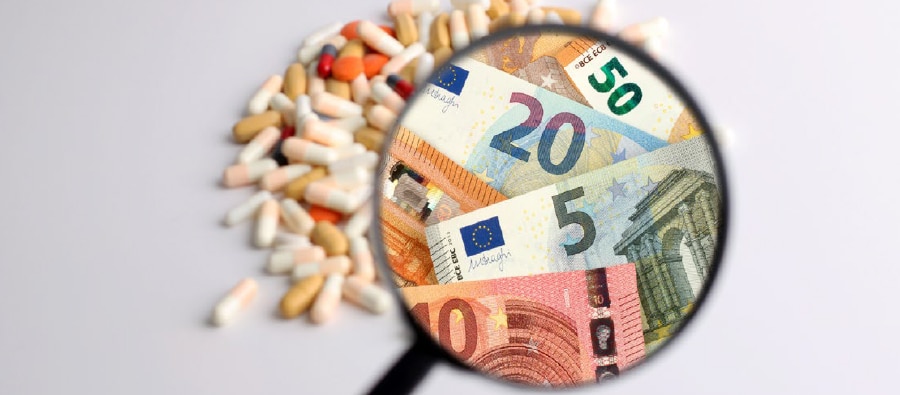- Overpriced, a report published by SOMO and Wemos, demonstrates the significant use of public funds for the development of medications in the Netherlands
- The use of public investments lacks restrictions, so the government is unable to control pricing for the pharmaceuticals developed from these investments
- In Spain, Salud por Derecho and the No es Sano platform analyzed several reports to demonstrate that the large use of public funds in the development of pharmaceuticals lacks public returns for that investment
- In 2015, the Dutch government made alarms go off before the arrival of a new medication for pulmonary cancer that would cost 200.000 euros a year and would absorb 11% of the budget for treatment purchase for all of the people who needed it. The tendency to increase prices prompted the Netherlands to put the issue of drug prices and the current model for innovation, research and development based on patents on the European agenda. They emphasized the need for a completely transparent model to know the “costs, prices and who pays what beforehand.”This request for transparency to the government has become a more important measure because we now know that public money finances a substantial quantity of basic research (and, increasingly, of applied research) and contributes to the development of medicines. However, as is stated in the report ‘Overpriced’, recently published by SOMO and Wemos, the government loses its opportunity to halt the high prices for medications that exclusively benefit the pharmaceutical companies by not establishing conditions of any kind on these public investments.
“Pharmaceutical companies argue that the reason their drugs are so expensive is because research and development is expensive, but this is simply not true. Much of the cost of research and development is borne by unconditional public investment. Because of this, the Government loses its chance to influence drug pricing”, says Esther de Haan, Senior Researcher at SOMO.
This public investment is produced directly by financing the development of new pharmaceuticals and indirectly through the investments made in biotechnology companies channeled through universities, public research entities and National and regional funds. The report tries to understand the direct and indirect public investment in the R+D of drugs, but it is limited because a lot of the information is not public nor accessible.
In addition to reporting the lack of transparency and the lack of public returns on the investments, Overpriced emphasizes the role of universities and research institution in R+D, which have held a more central role due to their promising discoveries. The next step in discovery would be the exclusive transfer of licenses to the private sector or the creation of a spin-off (a small initiative promoted by the members of the university community to ensure their ability to continue working on the development their discovery) that, with time, would be absorbed by a major pharmaceutical enterprise.
Spain, a similar situation
The case of the Netherlands is not unique. Recent research has discovered similar models on the use of public investment and the development of medications in the United Kingdom and Spain.
The report Public interest in biomedical research, published in January 2019 by Salud por Derecho, demonstrates the large public contribution in biomedical R+D (62 % compared to the 38% of the corporations), especially in research centers dependent on the Administration and the universities.
The report also shows how this public investment is hidden the moment it is transferred to the industry, causing the state to lose its capacity to have influence on crucial issues such as the price or the management of intellectual property. In addition, the report depicts the conditions in which these transactions take place, from the universities and research centers to the corporations, and the lack of inclusion of public interest criteria in the exploitation of licenses and in the transfer of patents, which are carried out in exchange for economic benefits of little significance.
Similarly, the No es Sano campaign, which Salud por Derecho promotes, started the #NosLaJuegan campaign a year ago, with which, through the analysis of four concrete oncology drugs, demonstrates the large contribution of the non-commercial sector in the development of the pharmaceutical, which are transferred or licensed to the private industry beforehand.
A current example is the novel therapy CAR-T for cancer (tisagenlecleucel and axicabtagene ciloleucel) whose research was largely funded by public resources—more than 300 million dollars only in the USA—and more than 60% of the clinical studies have been financed by universities, public centers for investigation or non-profit organizations. Both therapies are authorized and financed in Spain with prices between €320,000 and €370,000.
Transparency and Conditions, the Solution
Every time there are more governments in Europe concerned with the elevated prices of drugs. The reports conducted in the Netherlands, the United Kingdom and Spain show how the citizens pay several times for their medication through their taxes used to finance R+D, fiscal incentives and the donations to stimulate innovative development of medications, public investments in corporations derived from universities or with the purchase of medicines.
To this we can add the lack of transparency on the exact data of public expenditure in R+D of medications and other elements such as the patents or licenses, and the lack of conditions to ensure a socially responsible transfer of technology from the public sector to the private sector. In this sense, SOMO and Wemos, ask the European Union to introduce judiciary mechanisms to guarantee transparency and to implement conditions in financing that ensure returns on all of the public investments.
The Netherlands has already taken steps in this direction, and recently a study conducted by the government recognizes the necessity to promote licensing systems whose fixed prices for products and/or final services do not compromise accessibility.












